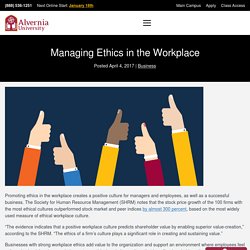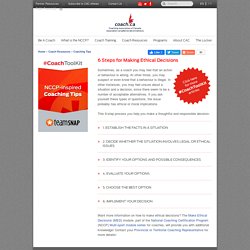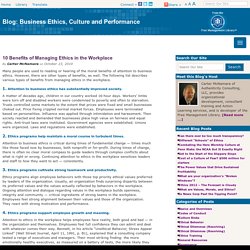

Mel
14 Advantages and Disadvantages of Ethical Leadership Styles. Ethical leadership styles create a set of positive standards which lead toward a supportive and honest work environment.

These standards are designed to reduce the changes that a lawsuit occurs within the workplace, creating job security for all those involved. Ethical leadership styles are built upon a foundation of integrity. This type of leader only functions when they are doing the right thing, even when no one else is watching or may ever find out that something unethical occurred. Every leader is going to make an ethical decision, even if they do not acknowledge that this is what they are doing at the time. When the framework is in place for every leader to make ethical decisions consistently, then you are in a place where you can accurately evaluate the advantages and disadvantages of an ethical leadership style for your workplace. List of the Advantages of Ethical Leadership Styles 1. 2. 3.
The Perceptions of Ethical and Sustainable Leadership. Why it Is Important to Implement an Ethics Program? Implementing an Ethics Program in the Workplace. Do your customers trust and believe in your company?

Do you trust and believe your employees? Do your employees trust and believe in you? Trust and transparency in conduct is ever more important in our information-heavy age, and ethics need to be clearly stated, flowing down from the highest executives. All employees and clients get their cues from the highly-visible executives and owners, and if they are seen to push the limits of ethical behavior, they will as well. 8 Guidelines for Managing Ethics in the Workplace. The following guidelines ensure the ethics management program is operated in a meaningful fashion: 1.
Recognize that managing ethics is a process. Ethics is a matter of values and associated behaviors. Values are discerned through the process of ongoing reflection. Therefore, ethics programs may seem more process-oriented than most management practices. 2. As with any management practice, the most important outcome is behaviors preferred by the organization.
Managing Ethics in the Workplace. Promoting ethics in the workplace creates a positive culture for managers and employees, as well as a successful business.

The Society for Human Resource Management (SHRM) notes that the stock price growth of the 100 firms with the most ethical cultures outperformed stock market and peer indices by almost 300 percent, based on the most widely used measure of ethical workplace culture. “The evidence indicates that a positive workplace culture predicts shareholder value by enabling superior value-creation,” according to the SHRM. Managing for Organizational Integrity. Many managers think of ethics as a question of personal scruples, a confidential matter between individuals and their consciences.

These executives are quick to describe any wrongdoing as an isolated incident, the work of a rogue employee. The thought that the company could bear any responsibility for an individual’s misdeeds never enters their minds. Ethics, after all, has nothing to do with management. In fact, ethics has everything to do with management. Rarely do the character flaws of a lone actor fully explain corporate misconduct. Managers must acknowledge their role in shaping organizational ethics and seize this opportunity to create a climate that can strengthen the relationships and reputations on which their companies’ success depends. Prompted by the prospect of leniency, many companies are rushing to implement compliance-based ethics programs. How Organizations Shape Individuals’ Behavior An FDA investigation taught Beech-Nut the hard way. Factors that Affect Ethical Behavior in the Workplace. How to Practice Ethical Decision Making at Work.
It's often clear what's right and wrong in a situation, but occasionally, the lines can get a little blurry.

When you encounter so many diverse viewpoints on a daily basis, your wrong can seem right to someone else, and vice versa. In these instances, it's critical you and your team knows how to make ethical decisions for the company. Click here to download leadership lessons from HubSpot founder, Dharmesh Shah. Practicing ethical decision making can help you maintain an honest, supportive, and fair workplace culture, but it's also necessary to ensure your company doesn't get into legal trouble or face major losses down the road. 6 Steps for Making Ethical Decisions. Home » Coach Resources » Coaching Tips Sometimes, as a coach you may feel that an action or behaviour is wrong.

At other times, you may suspect or even know that a behaviour is illegal. In other instances, you may feel unsure about a situation and a decision, since there seem to be a number of acceptable alternatives. If you ask yourself these types of questions, the issue probably has ethical or moral implications. 10 Benefits of Managing Ethics in the Workplace. Many people are used to reading or hearing of the moral benefits of attention to business ethics.

However, there are other types of benefits, as well. The following list describes various types of benefits from managing ethics in the workplace. 1. Attention to business ethics has substantially improved society. A matter of decades ago, children in our country worked 16-hour days. 2. Attention to business ethics is critical during times of fundamental change — times much like those faced now by businesses, both nonprofit or for-profit. 3. How Much Do A Company's Ethics Matter In The Modern Professional Climate? More than ever, a company’s success depends on the talent it’s able to attract, but attracting the best talent is about more than just offering the best salary—or even the best benefits.

Companies may have a lucrative offer for a prospective candidate, and a culture where they’ll feel at home, but how do corporate ethics stack up against those of its competition? This may not seem like the most important question to ask when you’re trying to hire someone for a position—especially one that might not be directly affected by the actions of your corporation as a whole—but the modern workplace is changing, as are American professionals’ values, and if you want to keep up, you need to know just how significant those ethical values are.
What Qualifies as “Ethics”? What do I mean by “ethics”? This is a broad category, and subjective in nature, but generally, I’m referring to these areas: